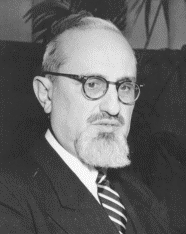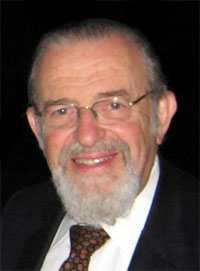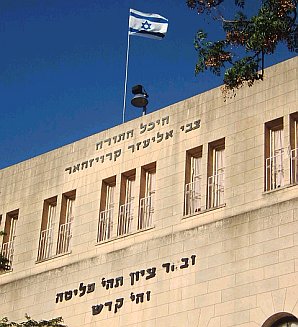A rabbi is a spiritual leader or religious teacher in Rabbinic Judaism. One becomes a rabbi by being ordained by another rabbi—known as semikha—following a course of study of Jewish history and texts such as the Talmud. The basic form of the rabbi developed in the Pharisaic and Talmudic eras, when learned teachers assembled to codify Judaism's written and oral laws. The title "rabbi" was first used in the first century CE. In more recent centuries, the duties of a rabbi became increasingly influenced by the duties of the Protestant Christian minister, hence the title "pulpit rabbis", and in 19th-century Germany and the United States rabbinic activities including sermons, pastoral counseling, and representing the community to the outside, all increased in importance.

Haredi Judaism consists of groups within Orthodox Judaism that are characterized by their strict interpretation of religious sources and their accepted halakha and traditions, in opposition to more accommodating or modern values and practices. Its members are usually referred to as ultra-Orthodox in English; however, the term "ultra-Orthodox" is considered pejorative by many of its adherents, who prefer terms like strictly Orthodox or Haredi. Haredi Jews regard themselves as the most religiously authentic group of Jews, although other movements of Judaism disagree.

A yeshiva is a traditional Jewish educational institution focused on the study of Rabbinic literature, primarily the Talmud and halacha, while Torah and Jewish philosophy are studied in parallel. The studying is usually done through daily shiurim as well as in study pairs called chavrusas. Chavrusa-style learning is one of the unique features of the yeshiva.

A kollel is an institute for full-time, advanced study of the Talmud and rabbinic literature. Like a yeshiva, a kollel features shiurim (lectures) and learning sedarim (sessions); unlike most yeshivot, the student body of a kollel typically consists mostly of married men. A kollel generally pays a regular monthly stipend to its members.
Modern Orthodox Judaism is a movement within Orthodox Judaism that attempts to synthesize Jewish values and the observance of Jewish law with the modern world.

Joseph Ber Soloveitchik was a major American Orthodox rabbi, Talmudist, and modern Jewish philosopher. He was a scion of the Lithuanian Jewish Soloveitchik rabbinic dynasty.

Agudath Israel of America is an American organization that represents Haredi Orthodox Jews. It is loosely affiliated with the international World Agudath Israel. Agudah seeks to meet the needs of the Haredi community, advocates for its religious and civil rights, and services its constituents through charitable, educational, and social service projects across North America.

Norman Lamm was an American Modern Orthodox rabbi, scholar, academic administrator, author, and Jewish community leader. He was the Chancellor of Yeshiva University until he announced his retirement on July 1, 2013.
Torah Umadda is a worldview in Orthodox Judaism concerning the relationship between the secular world and Judaism, and in particular between secular knowledge and Jewish religious knowledge. The resultant mode of Orthodox Judaism is referred to as Centrist Orthodoxy.

Rabbinic authority in Judaism relates to the theological and communal authority attributed to rabbis and their pronouncements in matters of Jewish law. The extent of rabbinic authority differs by various Jewish groups and denominations throughout history.
Jewish feminism is a movement that seeks to make the religious, legal, and social status of Jewish women equal to that of Jewish men in Judaism. Feminist movements, with varying approaches and successes, have opened up within all major branches of the Jewish religion.

Torah Umesorah – National Society for Hebrew Day Schools is an Orthodox Jewish educational charity based in the United States that promotes Torah-based Jewish religious education in North America by supporting and developing a loosely affiliated network independent private Jewish day schools.

Jewish education is the transmission of the tenets, principles, and religious laws of Judaism. Jews value education, and the value of education is strongly embedded in Jewish culture. Judaism places a heavy emphasis on Torah study, from the early days of studying the Tanakh.
Yeshivat Chovevei Torah Rabbinical School (YCT) is a Modern Orthodox yeshiva founded in 1999 by Rabbi Avi Weiss.

From the founding of political Zionism in the 1890s, Haredi Jewish leaders voiced objections to its secular orientation, and before the establishment of the State of Israel, the vast majority of Haredi Jews were opposed to Zionism, like early Reform Judaism, but with distinct reasoning. This was chiefly due to the concern that secular nationalism would redefine the Jewish nation from a religious community based in their alliance to God for whom adherence to religious laws were “the essence of the nation’s task, purpose, and right to exists,” to an ethnic group like any other as well as the view that it was forbidden for the Jews to re-constitute Jewish rule in the Land of Israel before the arrival of the Messiah. Those rabbis who did support Jewish resettlement in Palestine in the late 19th century had no intention to conquer Palestine and declare its independence from the rule of the Ottoman Turks, and some preferred that only observant Jews be allowed to settle there.
Zev Leff is an American-born Haredi rabbi, educator, author, and speaker. After serving as rabbi of the Young Israel of Greater Miami, Florida, for nine years, he and his family moved to Moshav Matityahu, Israel, in 1983, where he is the mara d'asra.
Shmuel Yaakov Weinberg, known as Yaakov Weinberg was an Orthodox Jewish rabbi, Talmudist, and rosh yeshiva (dean) of Ner Israel Rabbinical College in Baltimore, Maryland, one of the major American non-Hasidic yeshivas. Weinberg was also a rabbinical advisor and board member Haredi and Orthodox institutions such as Torah Umesorah, Agudath Israel of America and the Association for Jewish Outreach Programs.

Hod is an independent Israel-based organization run by and intended for Orthodox Jewish homosexuals. It was established by the Orthodox Rabbi Ron Yosef in 2008. The organization opposes anal intercourse between men, following the prohibition in Leviticus.
Joshua H. Ritchie is an American-Israeli haredi Rabbi, counselor and medical doctor. He is the founder and director of the Refuah Institute in Jerusalem, a non-profit orthodox-Jewish center which provides training in therapy techniques, life-coaching, marriage and youth counselling based within the Jewish halacha.
Yeshivat Maharat is a Jewish educational institution in The Bronx, New York, which was the first Orthodox yeshiva in North America to ordain women. The word Maharat is a Hebrew acronym for phrase manhiga hilkhatit rukhanit Toranit, denoting a female "leader of Jewish law spirituality and Torah". Semikha is awarded to graduates after a 3- or 4-year-long program composed of intensive studies of Jewish law, Talmud, Torah, Jewish thought, leadership training, and pastoral counseling. The ordination functions as a credentialed pathway for women in the Jewish community to serve as clergy members.










